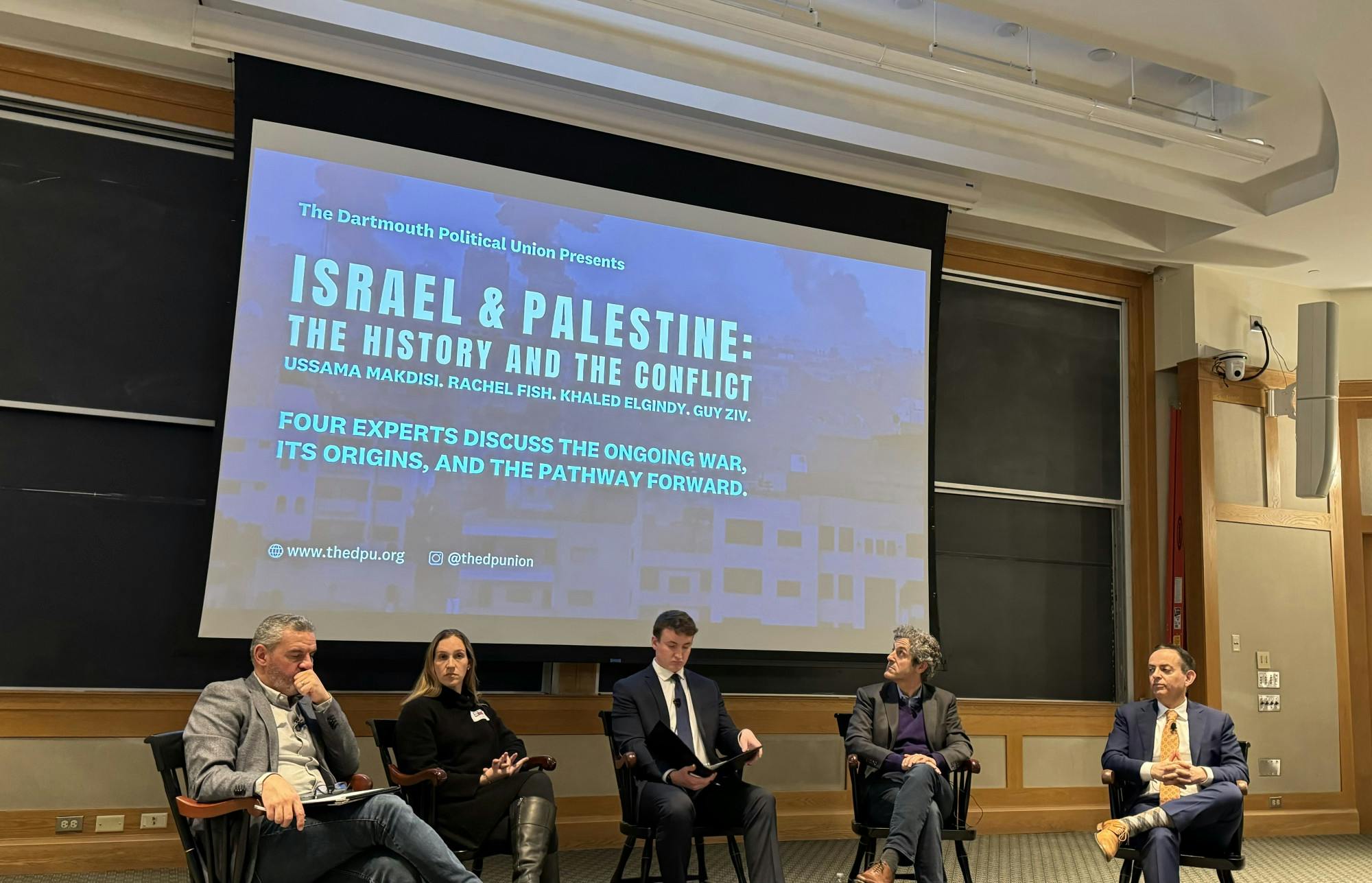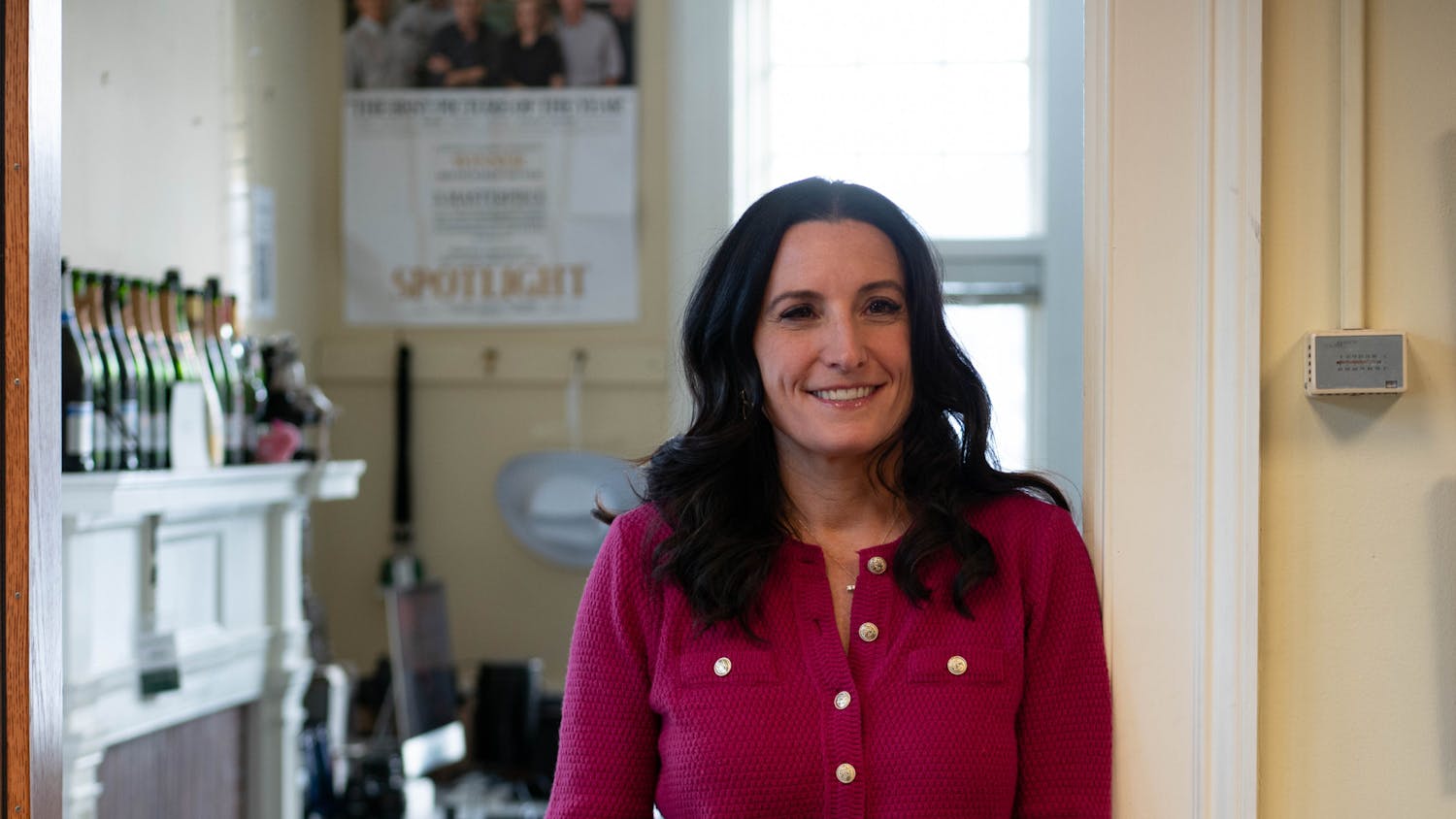On Feb. 1, the Dartmouth Political Union held a panel entitled “Israel and Palestine: The History and the Conflict” in Filene Auditorium. The panel featured Ussama Makdisi, Guy Ziv, Rachel Fish and Khaled Elgindy, four experts on the history of Israel and Palestine. It was moderated by DPU vice president Dylan Griffith ’25. According to DPU member Eli Moyse ’27, around 120 students, faculty and community members were in attendance.
Makdisi is a history professor and Chancellor’s Chair at the University of California, Berkeley, while Ziv is an associate professor at American University’s Foreign Policy Program at the School of International Service. Fish is an educational leadership visiting assistant professor at George Washington University and Elgindy is senior fellow at the Middle East Institute.
Griffith introduced the event by asking individual questions to each of the panelists to establish their viewpoints.
According to Makdisi, coexistence among different religious groups was common prior to the establishment of Israel and “advent of colonial Zionism.”
“The European Zionism project was trying to answer European questions, European racism, European anti-semitism [and] European nationalism,” Makdisi said. “Clearly, a Jewish state is not compatible with coexistence, insofar as it was forced on the native population, and led eventually to the Nakba of 1948, the ethnic cleansing of the Palestinians in 1948. That doesn’t mean that we can’t recover aspects of the history of coexistence.”
Fish discussed the increase in antisemitic attacks in both far-right and far-left groups following Oct. 7.
“For the American Jewish experience, there is a deeper understanding and recognition when it comes from the political hard-right,” Fish said. “It is harder for many Americans, let alone American Jews, to understand the ways in which Jew-hatred emerges from the hard-left. Much of that comes from the legacy of the Soviet Union, and the political framing of the way in which the Soviet Union utilized Jews and Zionism synonymously, interchangeably.”
Griffith then asked Elgindy, who advised Palestinian leadership in the late 2000s, if an extended pause agreement between Hamas and Israel is plausible, and what a pause would look like.
“I think there is a great hope that there will be an extended pause that could perhaps even turn into a de facto ceasefire,” Elgindy said. “I think the word ‘ceasefire’ has become taboo in Washington, [D.C.] in particular.”
Elgindy said that leaders in Washington, D.C. have “guarded optimism” for an extended pause. However, he added that he believes the Israeli leadership and public do not support a pause.
“There are things that are driving this carnage in Israel, and that has a lot to do with the politics in Israel,” Elgindy said. “Contrary to what many people believe, this is not solely [Prime Minister of Israel Benjamin] Netanyahu’s war … The Israeli public itself is the key driving force that is fueling this war.”
Ziv said that although Netanyahu has a reputation for being “known as ‘Mr. Security,’” the Israeli security establishment sees him as a “bungler … somebody who is more of a liability than an asset.”
“The one person who has yet to take any responsibility for what happened [on Oct. 7] … is Netanyahu, who seems to be trying to survive politically and is pinning the blame on the security establishment,” Ziv said.
Arguments ensued between the panelists when Griffith began asking follow-up questions.
In response to a question about how Israel should continue in the war, Ziv said that Hamas is “using schools and hospitals and ordinary [Palestinian] people as human shields,” to which Makdisi took objection.
“That’s propaganda, that’s not the answer,” Makdisi said. “You’re supposed to be a scholar.”
Although Griffith continued to ask questions, panelists often chose to respond to other panelists’ assertions with their allotted time.
Fish asserted that “millions and millions of dollars” in aid for Palestinians from the European Union and United Nation were “used to build tunnels” and “stockpile weapons.”
“I know I’m upsetting you,” she said to Makdisi, to which he replied, “No, you’re free to speak.”
Following Fish’s comments, Makdisi said that Fish failed to acknowledge the consequences of the conflict on Palestinian people.
“Over 10,000 children have been killed,” Makdisi said. “There is a mass starvation event taking place right now [in Palestine] — nobody in the world denies it. And all you can do is repeat Israeli talking points … at least be honest and be a scholar. Try not to repeat and insult my intelligence and other people’s intelligence by bringing in talking points.”
Later, members of the audience were invited to ask questions. One community member asked Elgindy and Makdisi what they would have advised Israel to do following the Oct. 7 attacks.
“What could have happened is a more targeted attack on Hamas, on Hamas’s weapons, on Hamas’s tunnels,” Elgindy said. “But this would have required something other than carpet-bombing Gaza … They [Israeli soldiers] are deliberately destroying apartment buildings. They are gleefully blowing up universities.”
In response to a question about whether war was the only option following the Oct. 7 attacks, Fish said that she believed that the ongoing conflict in Gaza was “emboldening political actors who … are interested in the demise and illegitimacy of Israel.”
Makdisi noted that Israel was “built on Palestinian land” and repeated that he believed Fish was “repeating Israeli talking points.”
“Well, then, you’re repeating Hamas talking points, what would you like me to tell you?” Fish asked.
Griffith defused the argument and asked the panelists to return to “a respectful academic discussion.”
In the aftermath of the dispute, Ziv said that Hamas is the “genocidal actor” in the conflict and added that both Palestinians and Israelis should ask themselves what comes after the conflict.
“Netanyahu refuses to talk about it, and the Palestinian leaders refuse to talk about it,” Ziv said. “Having a political and diplomatic horizon is essential.”
Makdisi said that it was not their job as academics to solve the conflict. However, he added that he would advise students in the audience to read both Israeli and Palestinian sources and avoid giving in to denialism.
“What you’ve seen on this panel here is an extraordinary amount of justification of genocide on the one hand, and denialism on the other,” Makdisi said. “There’s no recognition of the fact that ultimately what we’re talking about is, ‘how do you build a society between the river to the sea based on equality?’”
Patrick Ward ’27 said he came to the event because he wanted to learn more about the conflict from experts.
“I think [the event] devolved a little,” Ward said. “I think at the end they all kept trying to prove that each other is wrong, and it really distracted from the goal of the whole [discussion], which was information and exchange of ideas.”
Bea Reichman ’27 said that she was “grateful for the DPU for bringing the panelists in.”
“I think that it was an important reminder that academics who spend decades studying the conflict still come up with different opinions and different viewpoints,” Reichman said.
Eli Moyse ’27 is an Opinion columnist for The Dartmouth.
Vidushi Sharma ’27 is a managing editor and news reporter. She is majoring in Government and minoring in International Studies and Sociology. On campus, Vidushi is a Dickey Center War and Peace Fellow, an educational access advisor for the Dartmouth Center for Social Impact and an associate editor for the Dartmouth Law Journal.




